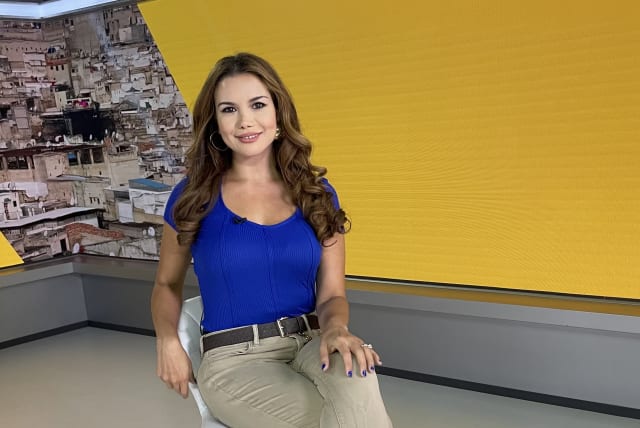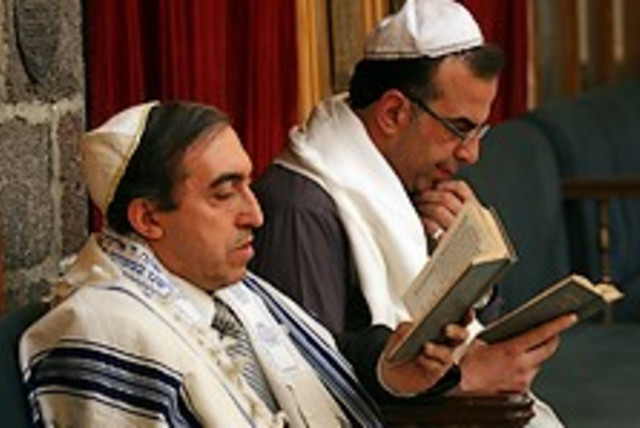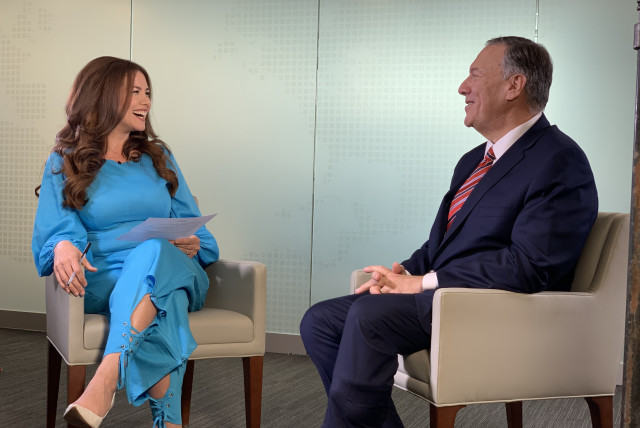What would happen to pro-Palestinian western youth under Hamas? - Syrian American journalist asks

A co-founder and host of the Yalla Show, Bouzo had a long career in journalism – both in Syria and abroad – before becoming a popular content creator based in the US.
“I was born into a liberal family, which was very unique in terms of Middle Eastern country standards. In our house, we never believed the media or the regime’s propaganda, and I always felt like I had a safe space back at my parents’ home where I could ask questions freely. This was not common at all in Syria, under the dictatorial Assad regime.”
Hayvi Bouzo, a Syrian-born journalist, spoke to The Jerusalem Post from her present home in the US. A co-founder and host of the Yalla Show, Bouzo had a long career in journalism – both in Syria and abroad – before becoming a popular content creator based in the US.
“It was only when I moved to the US that I realized how dangerous that ‘safe space,’ which I had the privilege of enjoying at home. If those conversations we had at home were ever to be discovered by the regime – our entire family would’ve been in danger, maybe even killed,” added Bouzo gloomily.
Bouzo was born and raised in the capital, Damascus, the hometown of her father, but traveled frequently between there and Aleppo, her mother’s birthplace. She has mixed ancestry, with grandparents from Arab, Turkish, and Kurdish roots. “Turkish and Kurdish! Can you imagine that today? But this is the core and essence of the Middle East; it’s how it used to be, historically. Unfortunately, this diversity was not celebrated by the time I was born. There was one specific dominant identity, and the rest were subjugated to suppression and marginalization.”
Interestingly, Bouzo says that her mother was raised with many Syrian Jews nearby. “They were a Muslim family, but they had many friends and neighbors who were Jewish. My mother had witnessed the systematic abuse turned against the Jewish communities by the authorities. She saw how they were made to flee. She would tell me and my siblings how she would cry and sometimes wouldn’t sleep at night knowing that when the morning comes, one of her friends or a neighbor may be gone along with their family.”

“We grew up hearing those stories about the Jewish neighbors and the crimes against the Jewish community in Aleppo,” Bouzo reminisces. “My father used to buy meat at the Jewish butcher’s in Damascus because it was known for its good quality. I personally never met any Jews in Damascus; the Ba’ath Party had already taken control of the state by the time I was born, and the Jewish community was already forced out from their ancient home inside the walls,” she adds.
‘Fired for talking of Jerry Seinfeld’s mother.’
Bouzo believes that the diversity and multiculturalism in her background were at the heart of her ability to overcome some of the dominant prejudices of her surroundings. “When you’re composed of conflicting cultures, you feel like you’re smack in the middle of everything. You understand that everyone is human and that everyone has their own perspectives on things.
“Journalism also aligns well with how I grew up. I watched hours of heated debates between my father and his friends, stark disagreements with much political awareness. It was a natural transition for me,” Bouzo says. “I was always pro-freedom and pro-human rights; I always wanted to give a voice to those who had to remain silent.”
Her background also ultimately led her to opt for a journalistic career. “I wanted to become a journalist since I was interested in people’s stories and in sharing new perspectives. This desire to become a journalist may also be explained by the reality in which I lived, where people were not free to share their thoughts freely and openly.”
Bouzo moved to the US as a teenager but then returned to Syria for a couple of more years, just before the uprising and civil war started. She started serving as the anchor on a couple of TV shows in Syria and Dubai, both in Arabic and English.
During 2007-2009, Bouzo worked with a station named Sham TV. “It was the first attempt to have a private TV station in Syria. Needless to say, it was never allowed to take off,” she adds ironically. She then moved to a new channel named Orient TV, where she worked as a host of an entertainment and culture show. She cohosted the first English radio show in Syria, Afternoon Drive, broadcast on MixFM.

“The show was about various topics – dating, psychology, etc.,” Bouzo recalls. “One time, we started speaking about successful Syrian expats from across the world, and I mentioned that Jerry Seinfeld’s mother is of Syrian Jewish ancestry and was born in Aleppo. Suddenly we started receiving phone calls, people were saying ‘Shame on you!’ ‘How could you celebrate someone Jewish?’
“They just started saying negative things about Israel, and I responded, “I’m talking about his mom being Jewish from Syria; why are [you] talking about politics?” I was in complete shock. By the way, the Assad regime used to do this occasionally. They faked calls to radio and TV stations to intimidate people from voicing their opinion if it became too unfavorable in their eyes.” The radio station manager ultimately fired her. “I got sacked because I mentioned Jerry Seinfeld,” Bouzo laughs.
Yalla TV: countering antisemitism, hatred and ignorance
Back in the US, Bouzo served as chief of Orient News. “Then came the pandemic, and for me, it was a time of introspection and realizing that as much as I liked talking about politics on TV, this was not a way forward to making the difference I wanted. So, I decided to dedicate my time and expertise to promote peace between Israel and Arab countries and between Jews and Muslims.
“First, I wanted to focus on dealing with the root cause of problems in the Middle East: antisemitism, hate, and discrimination against those who believe and think differently,” Bouzo says. “These are rooted and programmed in people’s minds by the media, education systems, and governments following decades of indoctrination. Our diverse history is forgotten. Growing up in the Middle East, you wouldn’t hear or learn anything about the very ancient Jewish history in the region.
Additionally, people are being demonized just for being who they are. For me, dehumanization is the saddest part of all. It has led the region to become fertile ground for terror groups, who destroyed life and hope for generations.”
“The solution I came to, to foster connections among people in the Middle East and North Africa (MENA) region and promote peace, was to cofound the Yalla platform with former US State Department official Len Khodorkovsky,” Bouzo adds. “In the show, we create soft and uplifting content for social media featuring mainly good news and positive stories from the region in Arabic and English, though our main target audience is still the Arabic-speaking world.
“Historically in the MENA region, those advocating for peace with Israel are punished and marginalized, while proponents of violence and terrorism who shout of ‘from the river to the sea’ are glorified. This is one of the most dangerous realities we face today in the MENA region. Yalla steps into this narrative as a force for change, seeking to counteract the deep-seated rhetoric that incites violence, antisemitism, and hatred. By bringing attention to shared histories and modern realities, Yalla fosters empathy and dialogue, striving for a future where humanization and mutual respect prevail between Israel and its Arab neighbors and amongst Jewish and Muslim communities worldwide.”
Bouzo explains that the Yalla Show, which has hundreds of thousands of followers and millions of views across major platforms, has a rule of thumb of discussing no politics whatsoever. “However, we do discuss the Abraham Accords, and we do bring up the implications and devastation caused [by] the Iranian regime.” The show touches upon innovation and inspirational stories of success in culture, sports, science, technology, and more.
Some of the most prominent interviewees on the show were former US Secretary of State Mike Pompeo, Emirati astronaut Hazza Al Mansouri, Moroccan actress Farah El-Fassi, and even Israeli actor and producer Lior Raz. “This was such an important episode! You’ll never see an Israeli actor speaking in Arabic media, even though Fauda is one of the most-watched series on Netflix in the Arab world. Yalla creates a home where celebrities and positive inspirational figures can be highlighted and showcased in an uplifting light.”
Bouzo recounts that most show viewers, available on Facebook, Instagram, X, YouTube, and its own website, are from non-Abraham Accords countries, including Algeria and Iraq, Morocco, the UAE, and Israel. “It goes to show that people are thirsty for these topics, even in these countries. It even shows a sign of hope,” she adds.
October 7 massacre and future plans
Then came the October 7 massacre. “This was devastating on so many levels,” says Bouzo mournfully. “As if the horrors of Hamas against so many Israeli Jews, Muslims, and Druze weren’t enough to process, then we also had to face the repugnant reactions on social media. We’ve been working on dehumanization for so long that more and more people started opening up. Still, then, the first responses to the attack on Arabic and social media were of people just going back to the narrative that they’ve been taught for decades, which is the total dehumanization of Israeli victims. Additionally, there was either complete denial that the massacre ever happened or a repulsive celebration and justification for it. Of course, it was shocking, but it also made me realize how crucial our work is.”
As for the shocking response from younger generations in the West, Bouzo makes a unique observation. “I was born in a country where people were brainwashed to become tools for the system, so I’m no stranger to that. I identify that here, too, many young people were and are being brainwashed. These young people born in democracies have no idea what it is to be born and raised under dictatorial regimes that support terrorists in committing atrocities. They think that these organizations are acting on behalf of a certain ‘cause.’ It’s heartbreaking for someone like me who knows how privileged they are to live in a free society. What would happen to them if they would’ve lived under regimes such as Hamas? We can all try to guess."
“I believe peace is the only way forward,” says Bouzo. “However, peace cannot be made with terrorist organizations, but rather between people, between Arab countries and Israel, and yes, between Israel and the Palestinians at some point, though several things must happen before that can be achieved.
“We must continue to share the untold stories of what happened in the Middle East. When Palestinians protested in Gaza a few years back, nobody covered that,” she adds angrily. “There are so many innocent Israeli hostages that are held by Hamas in Gaza today. The people of Gaza currently also find themselves under the grip of Hamas’s Iranian agenda, and to a greater extent, organizations such as Hamas, Hezbollah, the Houthis, and others under the Iranian regime’s influence are also holding the broader MENA region hostage. Hamas is the enemy of the region, not Israel.”
“At Yalla, we strive to provide a platform for the stories that no other channel in Arabic will share,” explains Bouzo. “We shared the impactful accounts of individuals like Manar al-Sharif, a Palestinian Syrian, who provided eyewitness testimony to the cruelty inflicted by Hamas on Gazans. Our storytelling included the compassionate endeavors of Israeli activist Vivian Silver, who dedicated her life to aiding Palestinians, and Awad Darawshe, an Arab Israeli paramedic. Tragically, both Silver and Darawshe were murdered by Hamas on October 7.”
Bouzo concludes: “I want to encourage our esteemed readers to support genuine grassroots efforts that encourage coexistence and people-to-people peace in every way they can. Through media and education, we can forge a path to a better, safer, and more peaceful tomorrow for everyone in the MENA region and beyond.”
